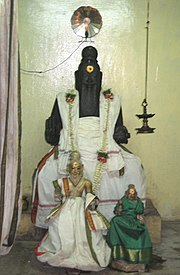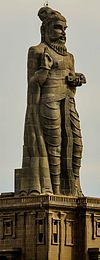Thiruvalluvar Temple, Mylapore
| Thiruvalluvar Temple | |
|---|---|
 Thiruvalluvar Temple in Mylapore | |
| Religion | |
| Affiliation | Hinduism |
| Location | |
| Location | Mylapore in Chennai, India |
| Country | India |
| Geographic coordinates | 13°02′23″N 80°16′16″E / 13.0398073°N 80.2710717°E |
Thiruvalluvar Temple is a Hindu temple in the neighborhood of Mylapore in Chennai, India. The shrine is dedicated to the poet-saint Valluvar. Believed to have been constructed in the early 16th century, the temple was extensively renovated in the 1970s.[1] The temple is under the control of the Hindu Religious and Charity Endowment Department.[2] The temple also serves as the venue for meetings of Tamil lovers.[2]
History
Close to the time of Valluvar's death, Elelasingan, a merchant at Mylapore and the disciple of Valluvar, expressed his desire to place Valluvar's body in a golden coffin and erect a monumental grave.[3] Politely refusing his request, Valluvar requested him to tie his corpse with cords and leave it among the woods outside the town in order for the wild animals to feed on it.[3][4] Elelasingan reluctantly obliged to his mentor's wishes and, upon doing so, observed that the crows and other animals that fed on his corpse "became beautiful as gold."[3] He then built a small temple on the spot where he left Valluvar's corpse and instituted worship, where it remained for centuries.[3] In the early 16th century, the present temple was built on the ruins of the old temple.[1]
The temple


Situated on a 25-ground plot,[2] the temple is located in a narrow lane adjacent to the Valluvar statue on Royapettah High Road. The temple complex has exclusive sanctums for various deities, namely, Lord Ganesha, Subramanya, Shiva (Ekambaranathar) and Parvathi (Kamakshi), and separate sanctums for Thiruvalluvar and his consort Vasuki.[1]
The temple's sthala vriksham (sanctum tree) is the punnai or mastwood (Calophyllum inophyllum), the very species under which Valluvar was found as a baby by his foster parents.[5] A pedestal was built around the tree in 1935, and the sacred tree was braced up with copper sheets.[5] Renovation of the temple began in 27 April 1973. Holy consecration (Kumbabishekam) of the temple took place on 23 January 2001.[5] The temple comes under the purview of the nearby Mundakakanniamman temple and is under the ambit of the Hindu religious charity department of the Government of Tamil Nadu.[5] There is also a library within the temple campus.[5] A community centre named “Valluvar–Vasuki Community Hall” has been built near the temple.[5] Classes on the Tirukkural are also held in the evenings for children.[citation needed]
In the introduction to his 1897 book The Ethics of Kural, J. M. Nallaswamy Pillai, describes the statue at the temple thus:
Those of you, who wish to have our idea of the personal appearance of the sage, may proceed to his shrine at Mylapore, a minute's walk from the Barber's Bridge, and witness the statue of the canonized saint. The folded knot of his lock, the bushy moustache and beard sweeping over his breast, the gravity of the forehead, the broad eyes revealing his noble heart, and the grace of his majestic frame are such as remind one of Plato and Socrates. Add to these, the beads in his right and the moral code in the left hand, the saint in a sitting posture on a raised seat, seeming to impart instruction to his disciples, you will verily believe that he is a Tamil Rishi next to Agasthya. He is in fact said to be the great grandson of Agasthya. At least the genealogy framed by the pandits states so.[6]
Rituals and Festivals
Like any other Hindu temple, the idols witness full Hindu temple rituals on a daily basis. Abhishekam (bathing the idol) is performed twice a day, along with alankaram (decoration). In the morning, rice is offered as neivedhyam (offering). Draped in a white dhoti, the idol of Valluvar sports a dash of vibhuthi (holy ash), kumkum (holy crimson), and sandalwood paste on the forehead.[2]
Besides these daily services, special pujas are performed during the Arubathi Moovar festival, the second day of the Chitrai month (April), Thiruvalluvar day (January), Chitra Pournami (full moon in the Tamil month of Chitrai, when the wedding of Valluvar and Vasuki is believed to have taken place) (April), and during the monthly Anusha star (the birth star of Valluvar).[2] The annual Vaikasi Anusham (Anusha star falling in the month of Vaikasi, around the month of early June) is celebrated as the birth day of the poet saint at the temple.
According to legend, Valluvar gave some mud to Vasuki and asked her to cook it into food in order to marry her, which she did obligingly. To commemorate this, Pongal pots are kept in front of the sanctum sanctorum and on the Chitra Pournami day (April), some mud is sprinkled into these pots before boiling rice into the dish of pongal.[2]
Funds
Being a small temple, the Valluvar temple cannot sustain itself and uses the funds from other temples. The temple's primary income comes from the wedding hall, a paid parking space and a few shops. The temple is part of temples that are under the Sri Mundagakanniamman Temple at Mylapore.[2]
See also
Citations
References
- "Thiruvalluvar's shrine". Madras Musings. 19 (9). 16–31 August 2009.
{{cite journal}}: Unknown parameter|authors=ignored (help) - Ramakrishnan, Deepa H. (15 November 2019). "As a war of words rages outside, peace reigns inside this temple". The Hindu. Chennai: Kasturi & Sons. p. 3. Retrieved 5 January 2020.
- A. A. Manavalan (Ed.) (2009). Essays and Tributes on Tirukkural (1886–1986 AD) (1 ed.). Chennai: International Institute of Tamil Studies.
- Edward Jewitt Robinson (2001). Tamil Wisdom: Traditions Concerning Hindu Sages and Selections from Their Writings. New Delhi: Asian Educational Services.
- "பொலிவிழந்து வரும் மயிலாப்பூர் திருவள்ளுவர் கோயில்!". Dinamani (in Tamil). Chennai: The New Indian Express Group. 20 September 2012. Retrieved 2 March 2019.


